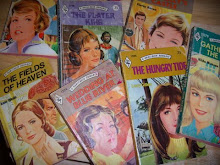Things that have been happening... goodness, quite a lot. Sonnet creations have been exposed for all to see and consider. This was much more intimidating than I expected. Individually written poetry seems to be much more personal than most other things you could compose. But, we lived through it and learned. I actually really enjoyed hearing all of them. They proved to be worthy of the glorifying adjectives so commonly mentioned in class. I suppose a recap couldn't hurt.
In reverse order of their being read.
Steve: wrote about a dog named Ricki (spelling uncertain). Even if they can't be together, it is still possible to love the other.
Medina: a sonnet to her mother Joy, whom she has come to profoundly appreciate through the hard times.
Ryan: recounts the epic hail storm and being caught in the middle of it with a broken-chained bike. And the appreciation of a kind lady to shelters him from his potential doom.
Amber: to her husband who she loves very much, and cars deeply about.
Greg: another classic expression of love for his wife whose favorite flower is the sunflower. She has him by the bill.
Krystal: to her young son Kyven who she hopes wonderful things for, like seeing the world.
Kimberly: Concerning a horse that will eventually be hers. Written to the family whose care it is currently under.
Tracy: to Rob, the guy awesome guy at the bar that makes the shift that much better. He even is nice enough to stick around when the creeps lurk and take out the garbage.
Whitney: to her wonderful father who she loves and will always love very much.
Jason: about the well-known wreck on the four-wheeler. Wounded body, and damaged vehicle, it was an experience to remember. An Advil was taken but a Tylenol sounds better for poetry purposes. Essentially, we were lied to.
Steph: to her song-writing boyfriend. To show her appreciation for him.His receiving poetry is nothing unusual.
Luke: reflections from his Australian walk-about. Concerning who you are, and what is inside.
Some other thoughts to ponder-
The things we're looking for are often right in front of us.
Why is it we suffer? Perhaps to give the writer s and poets something to write about.
Always a matter of life and death.
The things that seem completely irrelevant may in fact be the most relevant after all.
It is important to be aware of linguistic practices and uses, or you may become stuck in the "like" trap.
Knowledge doesn't necessarily make you happy.
Write what is needful.
It has become evident that there is a tremendous amount of content in Mr. Pip from which a topic concerning Matilda's great expectations may be derived. Passage after passage was rattled off and its according significance. As far as term papers go our guidelines are intentionally vague. Not just anything can be written as I made the fatal mistake of suggesting to Mr. Sexson. Naturally it must be relevant somehow to Matilda and to expectations. So not anything goes, but a clearly there a multitude of possibilities. We are reminded not to bore. It isn't a boring book I wouldn't say, so with the right approach and a little creative thought some fabulous topics might be had that will all but displease the teacher of 1130. A rough copy is apparently to be had for Monday. This has also been left open for various outcomes. All the better to expand our supposedly cramped up little minds and reach for new heights. Intimidation need not loom over our poor souls. This is a chance to have all kinds of fun, right? Well, maybe. Matilda is not such a regular old joe shmo without direction or purpose. She is really a pretty impressive individual, and it is all the more INTERESTING to see her go through some evens many of us will never even remotely encounter. So, what to write about... I think I have some thinking to do.


















